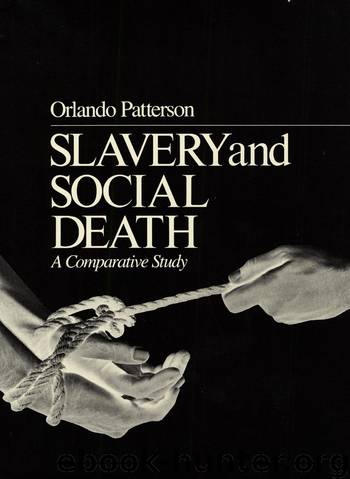Slavery and Social Death : A Comparative Study, With a New Preface (9780674916135) by Patterson Orlando

Author:Patterson, Orlando
Language: eng
Format: epub
ISBN: 9780674986909
Publisher: Harvard Univ Pr
The Freedman and the Freeborn
The status of the freedman in the community at large is the second major area to be considered. In a comparison across societies it is useful to distinguish between the political-legal status of the freedman and what may be called his prestige ranking. By the latter is meant the respect with which the freedman was viewed—the degree to which he was accepted as an equal who fully belonged to the community. Full political-legal capacity does not necessarily imply full social acceptance. Alternatively, there are a few cases where the freedman was fully accepted in prestige terms, yet did not achieve full legal and political capacity—this usually occurred where the ex-slave was a native-born person who fell into slavery for political or military reasons. A classic example is the Roman captured by the enemy who, after being ransomed, was freed postliminium but was subject to certain limitations with respect to his ransomer.
Let us begin with the problem of prestige ranking. Nominally granted almost complete equality, politically and legally, with “free” persons, freedmen nonetheless remained stigmatized. Even among people such as the Sena, who went as far as possible in incorporating the manumitted slave, freedmen were still “treated condescendingly by junior kinsmen,” were obliged to perform the most unpleasant tasks, and were first to be sold if the family faced starvation in a time of economic crisis.24 The stigma of former slavery meant that the freedman was rarely perceived as an equal. Only time could blot out the memory of the debased condition he experienced as a slave. Hence, full freedom came only to his descendants. How long this took varied from one society to the next.
In well over 80 percent of all significant slaveholding societies freedmen suffered some civil disability. Honored with the nominal status of citizenship, in practice they remained second-class citizens. In almost all societies ex-slaves were barred from the most important leadership roles in the community. (We exclude here, of course, the special case of palace slaves and freedmen, to be considered in Chapter 11.) Occasionally an ex-slave became a minor chief, as among the Mende, but such cases were always considered exceptional by the people themselves and could sometimes lead to trouble. The Duala of the Cameroon provide an instructive illustration. During the nineteenth century a captive married the daughter of a chief and produced a ruling family of one of the major Duala towns, Deido, but as Ralph A. Austen tells us, “The subsequent history of Deido is marked by particularly severe conflict with other Duala towns, culminating in the unprecedented execution of the chief, Charley Dido.”25
Even where freedmen were relied on to fill executive and administrative roles, it is important to recognize that the great majority of freedmen were excluded from such positions. Igor Kopytoff and Suzanne Miers make the important point that a range of slave statuses did not necessarily reflect significant mobility. Some slaves may have been acquired specifically for official tasks, others to work as laborers—and the latter may not have had the slightest chance of rising to the ranks of the former.
Download
This site does not store any files on its server. We only index and link to content provided by other sites. Please contact the content providers to delete copyright contents if any and email us, we'll remove relevant links or contents immediately.
Nudge - Improving Decisions about Health, Wealth, and Happiness by Thaler Sunstein(7692)
The Fire Next Time by James Baldwin(5431)
iGen by Jean M. Twenge(5408)
Adulting by Kelly Williams Brown(4565)
The Sports Rules Book by Human Kinetics(4379)
The Hacking of the American Mind by Robert H. Lustig(4375)
The Ethical Slut by Janet W. Hardy(4242)
Captivate by Vanessa Van Edwards(3838)
Mummy Knew by Lisa James(3686)
In a Sunburned Country by Bill Bryson(3536)
The Worm at the Core by Sheldon Solomon(3486)
Ants Among Elephants by Sujatha Gidla(3460)
The 48 laws of power by Robert Greene & Joost Elffers(3246)
Suicide: A Study in Sociology by Emile Durkheim(3018)
The Slow Fix: Solve Problems, Work Smarter, and Live Better In a World Addicted to Speed by Carl Honore(3007)
The Tipping Point by Malcolm Gladwell(2914)
Humans of New York by Brandon Stanton(2868)
Handbook of Forensic Sociology and Psychology by Stephen J. Morewitz & Mark L. Goldstein(2692)
The Happy Hooker by Xaviera Hollander(2686)
